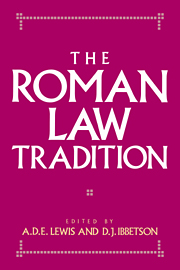Book contents
- Frontmatter
- Contents
- List of contributors
- Foreword: Peter Stein, Regius Professor of Civil Law in the University of Cambridge, 1968–1993
- List of abbreviations
- 1 The Roman law tradition
- 2 Labeo and the fraudulent slave
- 3 Doing and causing to be done
- 4 The danger of definition: contrectatio and appropriation
- 5 Going to the fair – Jacques de Révigny on possession
- 6 Bembo giureconsulto?
- 7 Gentilis and the interpretatio duplex
- 8 Ius gentium in the practice of the Court of Admiralty around 1600
- 9 Stair's title ‘Of Liberty and Servitude’
- 10 The actio communi dividundo in Roman and Scots law
- 11 Sale and transfer of title in Roman and Scots law
- 12 ‘What Marcellus says is against you’: Roman law and Common law
- 13 Audi et alteram partem: a limit to judicial activity
- Index of sources
- Index of names and subjects
13 - Audi et alteram partem: a limit to judicial activity
Published online by Cambridge University Press: 08 October 2009
- Frontmatter
- Contents
- List of contributors
- Foreword: Peter Stein, Regius Professor of Civil Law in the University of Cambridge, 1968–1993
- List of abbreviations
- 1 The Roman law tradition
- 2 Labeo and the fraudulent slave
- 3 Doing and causing to be done
- 4 The danger of definition: contrectatio and appropriation
- 5 Going to the fair – Jacques de Révigny on possession
- 6 Bembo giureconsulto?
- 7 Gentilis and the interpretatio duplex
- 8 Ius gentium in the practice of the Court of Admiralty around 1600
- 9 Stair's title ‘Of Liberty and Servitude’
- 10 The actio communi dividundo in Roman and Scots law
- 11 Sale and transfer of title in Roman and Scots law
- 12 ‘What Marcellus says is against you’: Roman law and Common law
- 13 Audi et alteram partem: a limit to judicial activity
- Index of sources
- Index of names and subjects
Summary
In 1966 Peter Stein, at that time Professor of Jurisprudence at the University of Aberdeen, published his excellent book Regulae Iuris, subtitled From Juristic Rules to Legal Maxims. While reading it again recently it occurred to me that a famous legal maxim was absent: the rule audi et alteram partem, sometimes also formulated in better Latin as audiatur et altera pars. Since the rule is of paramount importance to all who are, like myself, professionally concerned with a fair administration of justice, I think it right and proper to devote this contribution to it, as a rather late tribute to Peter Stein's work on the regulae iuris.
The principle audi et alteram partem, which, in the Common law, is regarded as one of the rules of natural justice, is not only self-evident but also – and perhaps for that very reason – valid for all time, as John Kelly showed some years ago.
Therefore, the fact that we can hardly find any text in the Corpus Iuris Civilis which explicitly refers to it should not lead us to the conclusion that the Romans did not recognise this principle. There is much evidence in sources outside the Corpus Iuris confirming that such a principle was held by philosophers and jurists, as Kelly has convincingly shown.
- Type
- Chapter
- Information
- The Roman Law Tradition , pp. 209 - 223Publisher: Cambridge University PressPrint publication year: 1994
- 1
- Cited by



